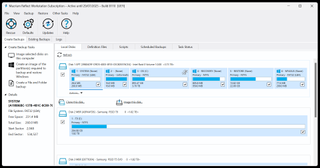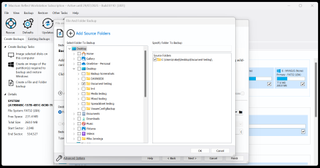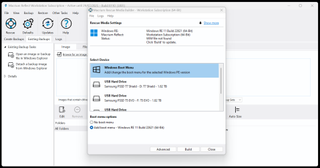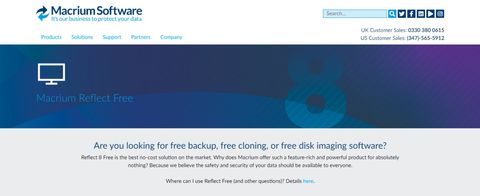TechRadar Verdict
Packed with options and very fast, but not ideal for cloud users.
Pros
- +
Packed with features
- +
Very fast
- +
Competitive pricing
Cons
- -
Few cloud options
- -
Intimidating interface
- -
Some rivals are even quicker
Why you can trust TechRadar
Macrium Reflect is the product of Paramount Software UK Ltd (trading as Macrium Software), a British software company, as its name suggests. It was founded over two decades ago and is currently based in Manchester.
Macrium released the first version of Reflect in 2006 and the most recent update in 2024. The software enables users of Windows-powered PCs or servers to create data backups and retrieve them when needed.
It's a multi-lingual backup software available in over a dozen languages, helping it maintain its position as one of Windows users' most popular backup utilities globally.
We've also highlighted the best disk cloning software right now.
Plans & pricing
We’ve tested Macrium Reflect Workstation, which provides one of the broadest range of features we’ve seen from a backup tool.
Elsewhere, Macrium Reflect is available in Server, Server Plus and Technician variants for businesses of all sizes alongside Macrium Reflect Home.
Macrium Reflect Workstation costs $78 for a one-year, one-PC licence, and the price rises to $162 per device if you buy a lifetime licence – a reasonable upgrade if you use this app for several years.
The Server options cost more than those Workstation products, with prices rising beyond $200 and $400 for Server and Server Plus one-year packages and almost doubling for lifetime options.
Thankfully, home and smaller business users can buy Macrium Reflect Home, which costs $50 for a one-year licence and $80 for a lifetime deal.
Across the board, these prices are comparable with rival tools, like those from EaseUS and Acronis, so there are no reasons to raise eyebrows.

Macrium Reflect: Features
There’s no shortage of features in Macrium Reflect. Users can backup or clone entire disks or operating systems, or their own selection of files and folders, and you’re also able to create backup templates, schedule them all and deploy full, differential or incremental backups.
Thankfully, Macrium also includes some templates to get you started with extensive backups on varying schedules.
Delve into the backup creation wizard and you can edit the source folders, choose any PC-connected destination, and even specify alternative backups if your preferred choice isn’t available due to a hardware or power failure.
There are a variety of compression, file size and password protection choices, encryption is available, and you can automatically verify your backups, set rules and commands for backups and receive emails and notifications about the status of your operations.
Scheduling options are extensive, restoration is easy, and Macrium users can also create bootable and rescue media and use Macrium Image Guardian to protect against ransomware.
It’s one of the most comprehensive set of backup options we’ve seen, and commercial and enterprise users can deploy a central console to manage backups across a whole suite of machines.
You get even more if you switch to one of the Workstation, Server or Technician products, too.
You can create live images of Windows operating systems boot backups in virtual machines, and some versions even have ReFS support, Windows Server backup and restore, Exchange and SQL backup and PC snapshots.

It’s a tremendous array of features, and Macrium doesn’t skimp on the data, either – open the app and you’ll get the full rundown of your disks and drives, their status, free space and file systems.
The only downside here is the lack of cloud backups. This is by design – Macrium reckons that cloud backups can often be impractical and not as safe as offline or local backup – it could drive customers away if they consider cloud options a vital addition to their backup tool.

Interface & Use
While that’s great for anyone who likes ample information when using a backup tool, it can make Macrium a little intimidating for beginners. Boot the app and you’re overwhelmed with information about your drives and destinations, and it’s hard to initially see how you even start creating backups.
There are certainly apps that look cleaner and less advanced, although a smaller set of features usually accompanies those interfaces.
Get your head around the app, though, and it’s pretty straightforward: operations and options on the left-hand side, information about your drives in the middle, and a pop-up wizard to guide you through the backup process.
Macrium pairs its advanced interface with impressive pace. We tested our latest slate of backup apps with a 42GB document folder, a 2.5GB spreadsheet folder, a 162GB folder of media and an 82GB file that mixes all of those file types. We backed them up to three different SSDs to weed out any inconsistency.
Its document backup time of 3 minutes and 46 seconds was excellent, and only ten seconds shy of our leading tool from EaseUS – and its media backup average of 7 minutes and 40 seconds was another second-place result out of nearly twenty backup tools.
Its Excel average of just over eight minutes is middling, and its mixed media result of nearly sixteen minutes is good rather than great.
Overall, though, it’s a great bill of health when it comes to performance. Macrium Reflect was one of the fastest backup apps we’ve tested, and only slips behind EaseUS for consistent speed.
Support
Macrium offers direct technical support to paid users through email and telephone. Every license includes one year of technical support, and you can renew it for a fee every ensuing year.
Macrium aims to respond to business users within 12 hours and to home users within 24 hours, and there are US, UK and European phone lines for business users.
Elsewhere, there’s a knowledge base and a busy forum, and premium support options are available for businesses who wish to pay extra.
It’s a solid slate of support options that should resolve most issues relatively quickly, which is essential for enterprise users who need to solve mission-critical problems.
The competition
Macrium’s lack of cloud options are its biggest fault, so if that’s important to you then we recommend Acronis Cyber Protect and EaseUS Todo Backup, as they include cloud options alongside the usual array of local backup destinations
Final verdict
Put aside the lack of cloud ability, though, and there’s loads to like in Macrium Reflect. It’s absolutely packed with features, its pricing is competitive, and it’s one of the fastest backup tools out there.
The interface can certainly be intimidating, and some business users simply won’t need the level of granularity available from this app, but Macrium Reflect is a top-tier bit of backup software.
Stefan has always been a lover of tech. He graduated with an MSc in geological engineering but soon discovered he had a knack for writing instead. So he decided to combine his newfound and life-long passions to become a technology writer. As a freelance content writer, Stefan can break down complex technological topics, making them easily digestible for the lay audience.

